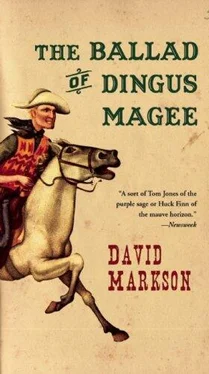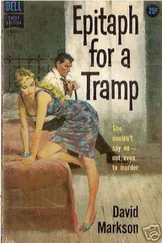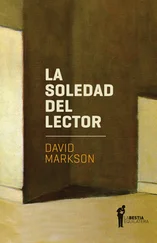“Nine dollars,” Dingus said.
“Well, that were a useful mule, but it’s the Christian thing, to take pity on a orphan newly sorrowing over his kin. Give me eight.”
“It’s gonter be right hard on me, getting to Galveston on only one dollar,” Dingus said.
“Nonetheless it’s proud experience for a boy,” the neighbor insisted. “Like that Eastern feller Waldo Emerson is always saying, folks has got to learn self-reliance.”
“Yes sir,” Dingus said.
He debated selling the watch, and went so far as to ask a jeweler about it, but the jeweler told him it had never been worth very much to begin with. And the cousin had left nothing pawnable either, save perhaps for the old anatomy book. Dingus took that to one of the doctors.
“I really ought to keep it for a souvenir,” he told the man, “since cousin Magee were so generous and kind in all the years, even to giving me one third of what we earned when all I done were the digging part. But I jest got to have some money.”
But the book was out of date. “Why not wait a few days,” the doctor suggested, “until the next time I hear about a burial, and then you could—”
“I still can’t lift them,” Dingus said, “being only eleven years old. I’d have to have a mule again, and then if I broke another leg I’d be in a real—”
“Borrow mine,” the doctor insisted. “Yes, do. Because I’d hate to have it on my conscience that I hadn’t assisted the nephew of a colleague. It can’t be too long, and then you would have the full twenty dollars for—”
“How much?” Dingus said.
“Twenty dollars. What I always paid Magee. You’re new at it, of course, but I’d be willing to pay the same amount that—”
“Oh,” Dingus said. “Well, I appreciate that, I truly do. Where’d you say you kept that mule again?”
“Just out in back. But you can’t simply go dig up any old thing, you know. The specimen has to be only recently interred, or—”
“I jest heard of one,” Dingus said. “From yesterday evening, Tuesday, which ain’t even twenty-four hours, and—”
“But who was—?”
“Feller named McNutt,” Dingus said, already turning out. “I’ll have him back here soon’s it turns dark.”
The next cousin was crazy, Dingus saw that immediately, although he could not have said precisely how. She was about forty, quite gray, and her skin was oddly colorless also, the hue of wet cardboard. She lived in an enormous old house, not her own, built in the Mexican style with linked, contiguous rooms facing an open inner courtyard, and before his arrival she had been completely alone.
But it wasn’t that. Nor did he mind the prayers either, to which she woke him the first morning and which he learned he was expected to endure each evening as well, in dumb formal ritual not before any altar or image but in the unroofed garden itself, under the sky. “It is not God,” the cousin said. “It is nature — the trees, the stars, the flowers — the all-embracing, transcendental oneness of things.”
“Yes’m,” Dingus said. “Nor do I speak words when I kneel,” she added. “I merely commune.”
“Yes’m,” Dingus repeated.
So it took him a few days, and then he had to go to a keyhole to find out. It was wine. She had a bottle in her hand which she was just opening. When he went back to the door two hours later she was removing the cork from a second one.
Her name was Eustacia. He did not know what she lived on, and she complained repeatedly of poverty. “Moreover it costs a pretty penny to feed an extra mouth,” she informed him, “although I do it gladly, out of a sense of the transcendental oneness of earth’s creatures. I merely hope that you appreciate it.” Frequently she had visitors, a group of anonymous and undifferentiated women of her own age and of an equal drabness who came singly or in clusters to sit for an hour. They were all unwed.
Like Magee, this cousin gave no thought to sending him to school either, although she finally did remark something she felt ought to be contributed to his up-bringing. This was just after he had gone to bed of an evening, perhaps at nine o’clock. He had not yet reached his fourteenth birthday. The cousin came into the doorway, considering him dubiously from beneath an upraised lamp. “I believe it is time you became cognizant of the facts of life,” she said.
“What’s them?” Dingus asked sleepily.
“Miss Grimshaw has volunteered to explain.” Miss Grim-shaw was one of the drab ladies, although Dingus could not have said which, even after the several years. Certain of them were teachers, and he expected her to appear with a book. But it was the cousin, Eustacia, who reappeared first, carrying a bottle of the wine instead. “Drink this,” she told him.
“Drink it?” Dingus said.
“Drink it all,” she insisted.
So when he awakened the next morning he still could not have said which one was Miss Grimshaw. “That’s quite all right,” the cousin said, “Miss Youngblood has volunteered to give you some further instruction tonight.”
It went on for a year or so. More often than not it occupied six nights in each week also, since there were six of the drab ladies in all. “I hope you appreciate my efforts,” the cousin said. “Above and beyond the financial difficulties, it is by no means easy for a maiden lady to bring up a young boy and be certain he is being educated as he should.”
“I’m most grateful,” Dingus said.
And then this cousin died also. It happened suddenly, one Sunday morning. Or perhaps it had been Saturday night, since she was already stiff when Dingus found her. She lay sprawled before a chiffonier with her fingers locked about the neck of an unopened bottle of chablis. It took Dingus an hour or two to rid himself of his hangover (the drink had become as much a habit as the drab ladies by then), and then he made use of his earlier training to dispose of the body himself, in the overgrown courtyard. He even knelt briefly in the usual place, if a little uncertain about precisely to whom he was commending her pantheistic spirit. “Anyways,” he said, “she put herself to considerable sacrifice on my behalf, and I hope she gets to be part of the transcendental oneness of things.”
He found the address of a third cousin, someone named Redburn Horn, in one of her drawers, and, surprisingly, he also came upon some four hundred dollars in cash. The first stagecoach for Santa Fe, where Horn lived, was not due to leave Galveston until Tuesday morning.
So he was still in the house on Monday evening when Miss Grimshaw appeared. “Eustacia died,” Dingus said.
“Oh,” Miss Grimshaw said. “Oh, I’m dreadfully sorry.”
“She were generous and kind.”
“Yes, Pm sure. And now you’re all alone.”
“I’m gonter go to Santa Fe. I got one further cousin.”
“Oh. But you’re not leaving tonight, are you? I mean, since I’m already here, and it is my night, and—”
“Well,” Dingus said, “I reckon if you made a special trip—”
She was gone in the morning, but he found the note on his table. It didn’t occur to me until I was ready to leave, it said, that I’d always settled with Eustacia herself the poor dear. But I might as well pay you directly this time. The ten dollars is beneath the vase on the dresser. Sincerely, (Miss) Felicia Grimshaw.
Cousin Redburn Horn turned out to be a poor substitute for a mother also, although this time the difficulty did not lie entirely with the man himself. He was a morose, dis-grunded widower in his early forties who sold and repaired leather goods for a living, and did not always make that. He had been left with four daughters, the oldest of whom was a year younger than Dingus, and the family lived in three cluttered, disarrayed rooms behind Horn’s shop. The man was arthritic, and he wore thick spectacles, and he talked idly about a dream of returning to the East. “Be hard to keep you,” he told Dingus gloomily, “even if Christian charity demands it.” Otherwise he rarely spoke at all, nor did he ask Dingus to help him in the shop (there was not enough work anyway). Dingus buried the four hundred dollars in an old sock, behind the woodpile.
Читать дальше












